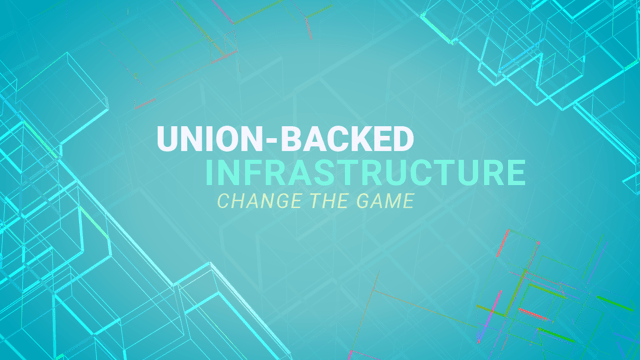Once again, infrastructure investment is in the news, and for good reason. The United States is behind much of the world when it comes to public funding of new construction, upgrades, and investment. It has been this way for so long that private investors have stepped in to help fill the gap.
“Labor and union contractors are so deeply invested in the communities in which they work.”
Sonia Axter, Ullico
As one of those investors through the Ullico Infrastructure Fund, Ullico provides a union-backed solution to America’s infrastructure problem. “The reason Ullico got into infrastructure is that we think that there is a broader role for labor and union contractors to play in the world by not only building these types of investments and operating them but investing in them and really being part of and driving that community-based solution,” said Sonia Axter, Ullico’s Managing Director of Infrastructure Investments, during an event hosted by the National Labor Management Conference (NLMC).
“What makes infrastructure unique as an investment is that the assets provide essential services like water, power, transportation, the movement of people and goods, among others, making these very important long-term community businesses. At the same time, the effort to address deferred maintenance issues and capital upgrades necessarily comes at an upfront cost. When you really think about having to upgrade and make changes, it needs to be something that’s driven by the community,” said Axter “Labor and union contractors are so deeply invested in the communities in which they work that our feeling is — and it’s been proven out in the last decade of our investing strategy — that this is a fundamental piece that historically and broadly can be missing when it comes to infrastructure.”
For plan trustees, infrastructure investments can provide relatively predictable income over the long-term. The same investments can simultaneously create union jobs.
“In New York, like any city, infrastructure projects strengthen local communities in numerous ways,” said Gary LaBarbera, President of the Building and Construction Trades Council of Greater New York, during the NLMC session. “When people are working, when people have the opportunity to work, through investments in infrastructure businesses and projects, not only does that build their own personal futures, but it builds their communities, because there is money that can be recirculated into the overall economy,” he said. “Infrastructure is the key component to a successful city, a successful country. Making an investment in infrastructure is making an investment in your own future and your community’s future.”
In addition to its goal of providing sound returns for its investors, Ullico makes good on its commitment to the labor community by stipulating responsible contractor policies and project labor agreements that require operations, construction and maintenance to be done by union contractors and workers. “We also care about the zip codes where the apprenticeship training hours are coming from,” said Axter. “You can build that into your investment structure. You can require local job creation and local training. Having that kind of foresight and community engagement can really make these investments sustainable for 30 and 40 years.”
She added: “If you’re giving people a path to betterment and dropping the economic development in the communities where you’re investing and not just taking money from that community and distributing it to other places, you’re driving value in an infrastructure investment in a sustainable way that allows these types of investments to keep going on and building upon the successes of others.”
How Infrastructure Investments Can Promote a “Just Transition” to Renewable Energy
The Ullico Infrastructure Fund includes 18 investments covering 494 assets throughout North America, representing most major sectors, including wind, solar, natural gas energy generation, electricity transmission, water distribution and wastewater collection and treatment, and transportation and social infrastructure.
Ullico’s investment strategy reflects an interest by investors in the long-term shift to renewable energy and the infrastructure assets that produce them. In the short-term, however, those renewable assets need to be backed by other types of assets, said Axter, and the transition period presents an investment opportunity.
“We have recently made an investment in a portfolio that has two new natural gas power plants that were recycled from old gas plants into state-of-the-art highly efficient gas plants,” she said. “Those power plants, in addition to battery plants that were recently built and opened, are backing up the renewable energy. Their role is not to be a key asset. Their role is to fill in the gaps until wind and solar and battery technology catches up over the next 25 years.”
These are the type of investments that can provide investors with long-term predictability, while promoting job creation. “It’s a bellwether to what can happen across the U.S. and something to think about in your local communities, how some of those lesser-regarded energy assets can be upcycled and be real good job creators, while backing the transition to a renewable country,” she said.
This transition to renewable energy is not just about future technologies. It’s also about workers. As new forms of infrastructure and power generation are developed, workers will need to be retrained as part of a “just transition” that doesn’t leave community members behind.
“There is no question that renewable energy is going to be an enormous industry going forward over the next several decades,” said LaBarbera. “When we move from fossil fuel facilities that are highly unionized into wind and solar, we need to ensure there’s a just transition. Those jobs are jobs that are going to provide family sustaining benefits and wages and careers for people.”

